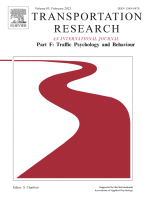-
Partager cette page
Effects of environmental, vehicle and human factors on comfort in partially automated driving: A scenario-based study
Publié le 29 mars 2022 – Mis à jour le 5 juillet 2022
Transportation Research Part F: Traffic Psychology and Behaviour
 Authors : Maxime Delmas, Valérie Camps et Céline Lemercier (CLLE)
Authors : Maxime Delmas, Valérie Camps et Céline Lemercier (CLLE)Although it is key to improving acceptability, there is sparse scientific literature on the experience of humans as passengers in partially automated cars. The present study therefore investigated the influence of road type, weather conditions, traffic congestion level, vehicle speed, and human factors (e.g., trust in automated cars) on passenger comfort in an automated car classified as Level 3 according to the Society of Automotive Engineers (SAE). Participants were exposed to scenarios in which a character is driven by an SAE Level 3 automated car in different combinations of conditions (e.g., highway × heavy rain × very congested traffic × vehicle following prescribed speed). They were asked to rate their perceived comfort as if they were the protagonist. Results showed that comfort was negatively affected by driving in downtown (vs. highway), heavy rain, and congested traffic. Interaction analyses showed that reducing the speed of the vehicle improved comfort in these two last conditions, considered either individually or in combination. Cluster analysis revealed four profiles: trusting in automation, averse to speed reduction, risk averse, and mistrusting automation. These profiles were all influenced differently by the driving conditions, and corresponded to varying levels of trust in automated cars. This study suggests that optimizing comfort in automated cars should take account of both driving conditions and human profiles.
Lien vers la publication





